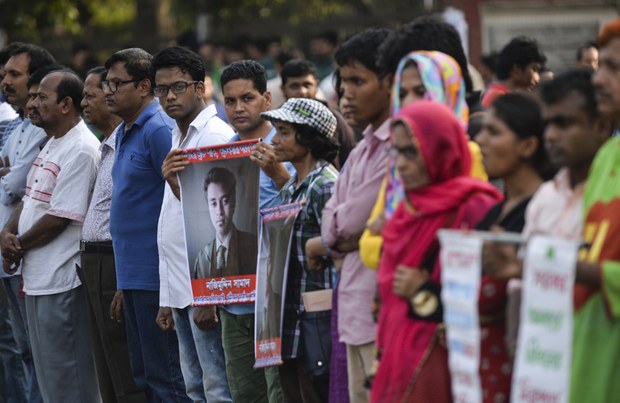Govt Officials Rip Amnesty Report on Blogger Killings, Free Speech in Bangladesh
2017.05.03
Dhaka and Washington
 Bangladeshi secular activists and university students protest in Dhaka following the machete-killing of law school student Nazimuddin Samad, who had identified himself as an atheist in online writings, April 8, 2016.
Bangladeshi secular activists and university students protest in Dhaka following the machete-killing of law school student Nazimuddin Samad, who had identified himself as an atheist in online writings, April 8, 2016.
Bangladeshi ministers Wednesday rejected a new report by Amnesty International (AI) that rebukes efforts by government officials to blame secular bloggers and publishers killed by religious extremists since 2013.
The report, published by the London-based worldwide rights watchdog a day earlier, slammed Bangladesh’s government for failing to protect dissenting voices or hold accountable militant groups who threaten them, as well as for stifling free speech through repressive laws.
“The Amnesty International report is old and recycled. They have been issuing repeated statements against us,” Civil Aviation Minister Rashed Khan Menon told BenarNews.
“The report is not a reflection of the latest situation Bangladesh. We cannot accept this.”
The Amnesty report, which specifically points out comments by Prime Minister Sheikh Hasina and Home Minister Asaduzzaman Khan Kamal that appeared to cast blame on the victims of blogger-killings, was issued the same day that police announced the arrest of the suspected IT chief of a militant group blamed for murders of secular writers dating back four years.
The report, titled “Caught Between Fear and Repression Attacks on Freedom of Expression in Bangladesh,” said the government had failed to protect at least seven secular activists killed –starting with the killing of blogger Ahmed Rajib Haider in February 2013.
AI cited a statement from the prime minister, which was widely reported in Bangladeshi media following the August 2015 killing of secular blogger Niladri Chottopaddhya, who known by the pen name Niloy Neel.
“No one in this country has the right to speak in a way that hurts religious sentiment. You won’t practice religion – no problem. But you can’t attack someone else’s religion,” Hasina said at the time. “It won’t be tolerated if someone else’s religious sentiment is hurt.”
Additionally, the machete-killing in April 2016 of law student Nazimuddin Samad, who identified himself as an atheist in online postings, led the home minister, Kamal, to instruct police to scrutinize Samad’s writings to see if they contained anything “objectionable” about religion.
On Wednesday, Information Minister Hasanul Huq Inu ripped into the Amnesty report while appearing at a meeting at the National Press Club marking International Press Freedom Day.
“Amnesty International has published a biased and motivated report. Amnesty did not stand by Bangladesh during its Liberation War; they did not utter a single word when Bangabandhu (Sheikh Mujibur Rahman) was assassinated,” he said.
The minister was referring to Bangladesh’s 1971 war of independence against Pakistan and Rahman, the country’s founding father and the late father of Sheikh Hasina.
IT chief arrested
On Tuesday, police announced the arrest of Ashfaqur Rahman (alias Ayan, Arif and Anik), who allegedly headed the information technology division of the military wing of Ansarullah Bangla Team (ABT), which Bangladeshi authorities have blamed for the killings of secular bloggers.
Rahman allegedly used his IT skills and computer science training to hack into social media accounts and collect information related to bloggers targeted for assassination by ABT, including obtaining their names and addresses as well as tracking their movements.
“Based on the information, the attacks were carried out,” said Monirul Islam, chief of the Bangladeshi police’s counter-terrorist unit.
In the string of attacks on bloggers dating to 2013, only the alleged killers of blogger Rajib Haider have been brought to justice while at least 25 suspects have been arrested related to the killings of five others – Chottopaddhya, Washiqur Rahman Babu, Ananta Bijoy Das, Avijit Roy and Faisal Arefin Dipan. Yet none of the suspects in these other murders have faced trial, AI reported.
Secular writers who have survived attacks or have threats against them told AI about unbearable conditions they face that force many to leave the country.
“My family life has been totally destroyed. My two children are so traumatized, they keep thinking that someone will kill their father,” said a secular activist who left Bangladesh and requested anonymity.
Another blogger who had decided to stay in Bangladesh told AI that he and his wife had been in hiding since 2015, “and that they felt compelled to move to a different location on a weekly basis.”
Others said they practiced self-censorship.
“The vast majority of activists, particularly those remaining in the country, had ceased writing and closed their blogs in response to the killings. Many also said that they had even grown afraid of expressing opinions on social media, or the internet in general, altogether, even anonymously,” AI reported.
‘The phone calls’
As far as media workers are concerned, some told AI that they or their colleagues had received threats from government officials, intelligence agencies or security forces.
“Bangladeshi journalists euphemistically refer to these threats as ‘the phone calls,’” the report said.
The threats often were not explicit, especially from government officials, but were implied through phone calls and other communication that raised concerns about particular reporting, journalists told AI.
The Bangladesh constitution guarantees free speech and a free press, but the nation’s legal framework can place undue restrictions on those rights, the 64-page report said.
The Information and Communications Technology Act, enacted in 2006, is frequently cited as the legislation most responsible for restricting free expression, the report noted.
Several provisions grant authorities “wide discretion in who can be charged … and some of its provisions give broad scope to stifle criticism of the authorities,” AI said.
Kamran Reza Chowdhury in Dhaka contributed to this report.







